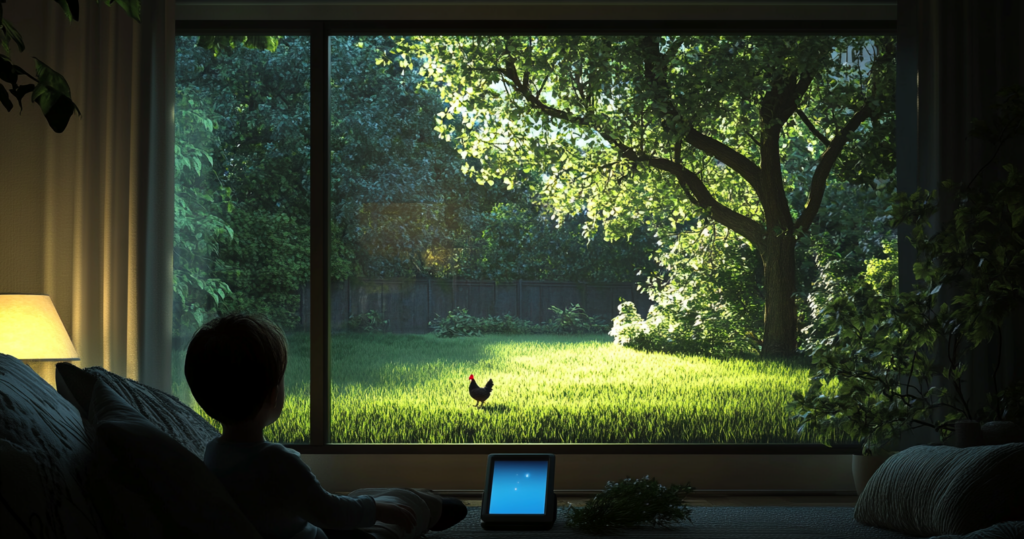There’s my eight-year-old, slack-jawed on the couch, watching another kid on YouTube build a digital farm. Outside our window? Our actual backyard sits empty, sunlit, and definitely chicken-ready. But here we are, captivated by someone else’s virtual rutabagas.
“He’s not even playing the game,” I mutter to my wife. “He’s watching someone else play the game. It’s like watching someone else eat lunch and calling it a meal.”
And yet there he sits, mesmerized by this strange new form of entertainment that makes zero sense to my analog brain. Which brings me to the daily question haunting parents everywhere: Are we protecting their developing minds, or are we just control freaks in denim who secretly miss the days when boredom led to tree forts instead of TikTok dances?
Our Family’s Tech Rules (That We’re Still Figuring Out)
Here’s our current setup: No video games, no smartphones, weekend-only TV, and laptops strictly for homework. We’re basically Amish with a Netflix password and strong opinions about screen time.
I’ll be honest—sometimes I feel like we’re the only family without a gaming console. Or a clue. When other kids talk about Fortnite victories and Pokémon trades, my kids nod along like foreign exchange students trying to follow a conversation about cryptocurrency.
Last week, our eight-year-old came home from school and told us he tried to “double click” his pencil on a math test. Apparently, our low-tech approach has some gaps in practical application.
Why It’s So Hard to Find Balance
Modern technology is like sugar—it’s everywhere, it’s cheap, it’s addictive, and trying to regulate it without becoming the Fun Police requires the diplomatic skills of a UN mediator and the patience of a saint.
The internal battle is real: Am I being a mindful parent, or am I just one power outage away from becoming a doomsday prepper who hoards board games and makes sourdough starter?
The truth is, screens are the only babysitter that never asks for a ride home, never calls in sick, and can entertain your kids for hours. They also never leave. Like that house guest who’s been “just staying a few days” for the past three months.
The Surprising Things We’ve Noticed
The good news about low screen time:
Our kids actually invented an entire cardboard city last month. Complete with zoning laws. Apparently, the residential area can’t be next to the pizza district because of “noise complaints.” Who knew?
They talk to each other. Sometimes even nicely. Shocking, I know.
Our ten-year-old still thinks phones are primarily for talking to people. Revolutionary.
The less good news:
They were absolutely clueless about Google Docs until age ten. Watching them navigate a shared document was like watching my grandmother try to operate a smartphone—lots of squinting, random clicking, and mild panic.
“We don’t have that” has become our family motto. It’s right up there with “Because I said so” and “Ask your mother.”
Here’s the kicker: You actually have to entertain your own children. Regularly. For free. Like it’s 1992 and you’re their cruise director, activities coordinator, and chief entertainment officer all rolled into one tired parent.
What’s Actually Helping (For Now)
Tech with a purpose: We’ve found that technology works best when it has a clear job. Homework research? Yes. FaceTime with grandparents? Absolutely. Educational documentaries about ancient Rome? Sure. And yes, that one ninja cartoon that I secretly enjoy more than my kids do.
Simple rhythms over strict timers: Saturday morning TV happens like clockwork. No negotiations, no spreadsheets tracking minutes, no complex point systems. “TV happens Saturday morning” is a complete sentence that requires no further explanation.
Owning the weird: We’ve embraced being the “no devices at dinner” people. Yes, we’re those parents. We’re also the ones who have actual conversations during meals, even if I occasionally dominate the discussion by talking for fourteen minutes straight about why we shouldn’t put ketchup on everything. (Spoiler: we put ketchup on everything anyway.)
Ongoing conversations with kids: We try to explain our choices beyond “because I said so.” We talk about why their brains matter more than another Minecraft mod, why attention spans need protection like endangered species, and why sometimes being bored is actually good for them.
Bigger Picture: What Are We Really Protecting?
This isn’t about banning technology or pretending it’s 1955. My kids will grow up in a digital world, and I want them equipped for it. But I also want them to know how to use a hammer and a keyboard with equal confidence.
I want kids who can build things with their hands and their minds, not just swipe, scroll, and forget. I want them to experience that particular kind of creativity that only comes from staring at the ceiling for ten minutes before suddenly knowing exactly what they want to draw.
Here’s my honest moment: I might be getting this completely wrong. I probably already have made mistakes. But I’d rather regret being too restrictive about screens than regret losing their imagination altogether.
Action Steps for Fellow Parents
Start with your values. Not your neighbor’s setup. Not what every other kid in the class is allowed to do. Start with what matters most to you.
Create predictable tech rhythms. When screen time has a reliable schedule, every decision doesn’t feel like a Supreme Court case. “Saturday morning cartoons” is easier than micromanaging every minute.
Watch behavior, not just time. What matters isn’t the screen time total—it’s the aftermath. Are they grumpy? Restless? Calm? What kind of kid comes out the other side?
Talk about tech like it matters. These aren’t random house rules. They’re values-based decisions that shape how your family pays attention, stays present, and grows.
Adjust when needed—and laugh along the way. Last month I realized I’d been so focused on limiting screen time that I’d never taught them basic email etiquette. My kid sent his teacher an email that just said “ok” with no subject line. Priorities, right?
We’re Not Experts—Just Tired, Trying Parents
Look, we’re not anti-technology. I’m writing this on a laptop, probably while sitting next to a smartphone that I check way too often. We just don’t want to outsource our kids’ childhoods to an algorithm designed to harvest their attention.
If you’re second-guessing your approach to family tech—whether you’re more restrictive or more permissive than us—the fact that you’re questioning it probably means you’re doing better than you think.
We’re all just trying to raise humans who can function in this weird new world while still retaining some capacity for wonder, boredom, imagination, and genuine human connection.
If you’re building a low-tech childhood in a high-tech world, you’re not alone in this analog rebellion. Keep going. Your kids might complain now, but someday they’ll thank you for teaching them that the real world—as messy and imperfect as it is—is still worth paying attention to.
Screens will always be there. But tree forts, cardboard cities, and ketchup-covered dinner debates? Those have a shelf life. Protect them while you can.
The Focused Fool – Growing As Men. Leading As Fathers.


Leave a Reply